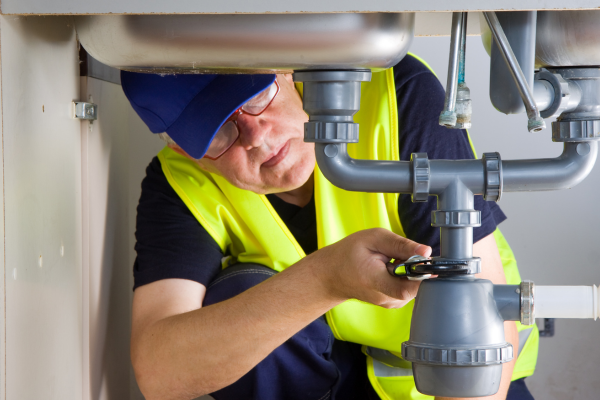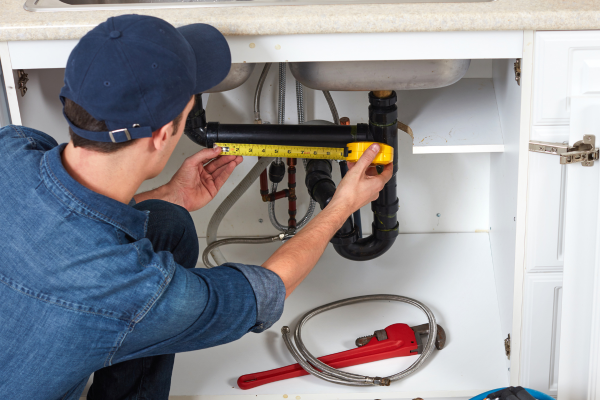JOB PROFILE
What Is a Plumber?
IN THIS JOB PROFILE
You Will Learn.
- What a Plumber is.
- What the responsibilities of a Plumber are.
- What qualifications a Plumber needs.
- Average salary of a Plumber.
- What skills a Plumber needs.
- Who employs a Plumber.
- Where the latest Plumber jobs are and how to apply for them.

What Is a Plumber?
A Plumber is a skilled tradesperson responsible for fitting, maintaining and repairing water systems in different types of infrastructure that are used for drinking water, irrigation and sewage. To successfully fit and repair such systems, a Plumber must be skilled in cutting and joining pipes.
On a day to day basis, a Plumber will work on water systems such as baths, toilets, sinks, drainage pipes and home appliances such as dishwashers and washing machines.
A Plumber will also be expected to fix heating systems if a fault has occurred and be able to service central heating systems and radiators.
What Are the Responsibilities of a Plumber?
While working as a Plumber, you will be required to:
- Install pipes in water and heating systems.
- Maintain pipes in water and heating systems.
- Draft blueprints for an efficient installation process.
- Test pipes for leakage.
- Cut and join pipes to create new pipe systems.
- Communicate with project managers and clients.
- Estimate the materials required to complete a job.
- Conduct quality checks to ensure the safety of completed work.
- Work effectively with other tradespeople on important building projects.
- Ensure plumbing systems meet safety regulations.
Frequently Asked Questions
What Qualifications Do Plumbers Need?
In the UK, there are no formal academic qualifications needed to become a Plumber.
The typical route to training as a Plumber is to either complete a college course or apprenticeship.
College courses are designed for people who have prior experience in plumbing and those who don’t. Accredited courses include a Level 2 and Level 3 Diploma course in Plumbing and Domestic Heating or a T Level course for Plumbing and Domestic Heating Technicians.
You may choose to complete one of the above courses if you are either starting or looking to improve your career as a Plumber and typically these courses take one to two years to complete.
Apprenticeships are also a popular entry into plumbing. An apprenticeship programme will equip aspiring plumbers with the skills and experience needed to succeed in the industry by learning on the job.
An intermediate and advanced apprenticeship and plumbing and domestic heating is available for those looking to complete this type of course, however an NVQ Level 2 diploma must be earned prior to this.
Should you wish to enter into an advanced apprenticeship programme, it is worth remembering that these apprenticeships can take up to four years to complete.
For a Plumber to work with gas systems, additional qualifications, such as a CCN1, CPA1 or a Level 3 Diploma in Gas Utilisation Installation and Maintenance will need to be obtained.
A Plumber working with gas will need to know the core safety gas processes and the core practical skills required to complete work.
What Is the Average Salary of a Plumber?
The average salary for a Plumber in the UK is around £26,000 per year. In London, Plumbers can expect to earn £32,000 per year.
However, this can vary depending on factors such as the region of the UK, the level of experience, and the type of plumbing work being done.
Some plumbers who specialise in certain types of plumbing, such as gas or commercial plumbing, may be able to earn higher salaries due to the specialised nature of their work.
In addition, plumbers who are self-employed or run their own businesses may have the potential to earn higher salaries based on their level of success and the number of clients they are able to attract.
Who Employs a Plumber?
Many Plumbers choose to be self-employed and therefore liaise directly with their own clients and manage their own day to day workload.
However, a Plumber may also be employed by an organisation such as a Local Authority or a school. Whilst some Plumbers prefer to work for large organisations, others choose to work within a small company employing less than ten people.
Plumbers can also be employed by construction companies or plumbing contractors who work on residential, industrial and commercial buildings and infrastructures.
It is also common for a Plumber to work alongside an architectural firm to complete work on new builds.
Anywhere that has the resources for running water offers the opportunity of employment for a Plumber, so there will always be the requirement for people to enter the industry

What Skills Does a Plumber Need?
Key skills of a Plumber include:
- Problem solving skills to decipher and fix complicated plumbing issues.
- Knowledge of building and safety regulations to ensure work is completed to an appropriate standard.
- Good communication skills to liaise with colleagues and clients.
- Physical fitness to lift heavy tools and plumbing equipment.
- Patience to successfully fix complicated plumbing issues.
- Good time management to complete fixes in a timely manner.
- Maths knowledge to calculate important measurements.
- Teamwork to effectively work alongside other tradespeople.
- A knowledge of health and safety to ensure regulations are met at all times.
- An eye for detail to ensure plumbing work is completed to a high standard.
Construction Insights.
Searching for Your Next Plumber Job?
If you're searching for your next career opportunity, why not take a look at all the latest Plumber jobs available now?
We work with hundreds of Local Authorities and private sector organisations throughout the UK so why not get in contact with one of our specialists who can advise on current and upcoming opportunities?
Meet The Construction Team.

Upload CV
If you're searching for your next Plumber job, why not upload your CV?
Once registered, your CV will be directed to the most relevant consultant and they will contact you when a suitable vacancy becomes available.